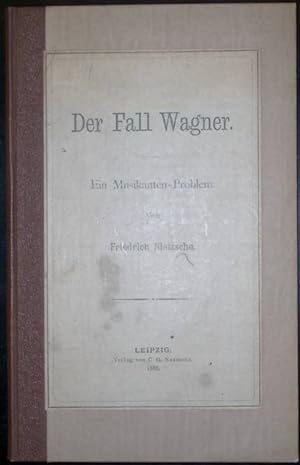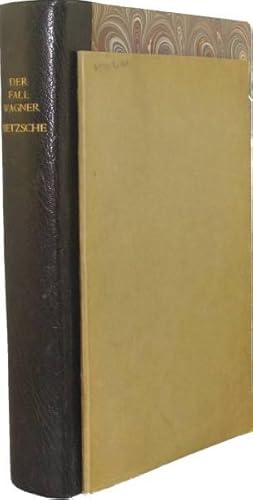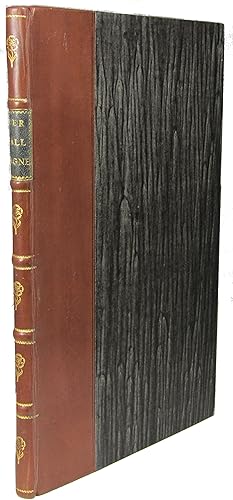der Fall Wagner. von Nietzsche Friedrich or Friederich (5 Ergebnisse)
Produktart
- Alle Produktarten
- Bücher (5)
- Magazine & Zeitschriften
- Comics
- Noten
- Kunst, Grafik & Poster
- Fotografien
- Karten
-
Manuskripte &
Papierantiquitäten
Zustand
- Alle
- Neu
- Antiquarisch/Gebraucht
Einband
Weitere Eigenschaften
- Erstausgabe (2)
- Signiert
- Schutzumschlag
- Angebotsfoto
- Kein Print-on-Demand
Land des Verkäufers
Verkäuferbewertung
-
Der Fall Wagner - GötzendämmerungNietzsche contra Wagner Umwethung aller Werke (1. Buch: Ser Antichrist) Dichtungen (Nietzsches Werke, 1. Abtheilung, Band VIII)
Verlag: Alfred Kröner, Leipzig, 1111
Anbieter: Antiquarische Fundgrube e.U., Wien, Österreich
Buch
Halbleder. 462 S. Kanten etw. bestoßen L047 *.* Sprache: Deutsch Gewicht in Gramm: 550.
-
SAMMELBAND - Die Geburt der Tragödie (The Birth of Tragedy) [bound with Unzeitgemässe Betrachtungen (Unconventional Observations) I-IV second edition and Der Fall Wagner (The Case of Wagner) second edition].
Verlag: E. W. Fritzsch, Leipzig, 1886
Anbieter: Eternal Return Antiquarian Bookshop, San Diego, CA, USA
Verbandsmitglied: IOBA
Hardcover. Zustand: Very good. Second Edition. NIETZSCHE, Friederich. Die Geburt der Tragödie (The Birth of Tragedy) E. W. Fritzsch, Leipzig:, 1886. Second (definitive) edition. Schaberg 42. [bound with Unzeitgemässe Betrachtungen (Unconventional Observations) I-IV. C. G. Naumann, Leipzig, 1893 second edition and Der Fall Wagner (The Case of Wagner). Naumann, Leipzig, 1892 second edition]. Octavo.Collation: Blank leaf + Unzeitgemasse Betrachtungen, erster band TP + [III] - XV + 2 half titles + [1] - 206 + [207] - [208] = Publisher's ads + Unzeitgemasse Betrachtungen, zweite band TP + 2 half titles + [3] - 205 + [206] - [208] = Publisher's ads + Die Geburt der Tragodie TP + [III]-XVIII + half-title + [III] - IV + 1 - 144 + Der Fall Wagner TP + [i] - [iv] = Vorwort + half-title + [1] - 57 + [58] = Printer s information + blank leafUnzeitgemasse Betrachtungen I - IV: This is the second volume of the soon to be aborted "Collected Works" edited by Nietzsche's closest friend, Peter Gast (whose introduction appears here as a Foreword). The second attempt to put out a complete edition was more successful - mostly because it was driven to completion by Nietzsche's harridan sister, Elisabeth.Die Geburt der Tragodie: There were originally 576 copies issued in this Second Edition, Second Issue state - This is the DEFINITIVE EDITION with the FIRST APPEARANCE of all of Nietzsche's corrections AND the famous and important new introduction called "An Attempt at Self-Criticism" in which Nietzsche points out that, despite the Kantian and Schopenhauerian overtones, Birth of Tragedy should not be read in such metaphysical terms. Rather than a naive optimism.Rather than a pessimism of weakness and decline.Is there a pessimism of strength? Der Fall Wagner: In mid-1888, Nietzsche returned to the subject of Richard Wagner and produced this polemic against his former friend and mentor whom he attacks in a volley of witty barbs against both the man and his music. By this time, Nietzsche saw Wagner as not just a singular problem but one which was symptomatic of his entire culture - Wagner and modernity were basically decadent. Both of them, he contends, lack integrity, manifesting instead a type of anarchy in which "life no longer dwells in the whole". A Nietzschean tour-de-force.CONDITION: Very good in original half cloth with marbled boards. Spine lettered in gilt: "NIETZSCHE / Ansgewahlte Werke"; Light scuffing to boards. Previous owner s name in ink to front free endpaper with elegantly scripted "Inhalt" [contents] written below. Small closed tear to first title page of Unzeitgemasse Betrachtungen and light penciling to Geburt der Tragodie. A wonderful copy of a selection of Nietzsche s writings all with the original 19th c. charm. PHOTOS AVAILABLE UPON REQUEST.
-
Der Fall Wagner. Ein Musikanten - Problem.
Verlag: Leipzig, C. G. Naumann., 1888
Anbieter: Antiquariat Weinek, Salzburg, Österreich
Buch
3 Bll., 57 S. Priv. Hlwd. mit aufgezogener OBrosch. EA. - Exlibris a. V., aufgezogener Titel fleckig, im Ganzen ein schönes Expl. Sprache: deutsch.
-
Der Fall Wagner (The Case of Wagner).
Verlag: C. G. Naumann, Leipzig, 1888
Anbieter: Athena Rare Books ABAA, Fairfield, CT, USA
Erstausgabe
FIRST EDITION. TP + 3 leaves + [1]-57 + [58], Octavo. Schaberg 54. Nietzsche had 1,000 copies of this work privately printed but 500 of them were falsely marked "Second Edition" so there were originally only 500 copies in this state. In mid-1888, Nietzsche returned to the subject of Wagner and produced this polemic against his former friend and mentor whom he attacks in a volley of witty barbs against both the man and his music. By this time, Nietzsche saw Wagner as not just a singular problem but one which was symptomatic of his entire culture - both Wagner and modernity were basically decadent. Both of them, he contends, lack integrity, manifesting instead a type of anarchy in which "life no longer dwells in the whole". A Nietzschean tour-de-force. Lacking the original covers, this copy is wrapped browned plain paper wraps. Very slight occasional light pencil markings. Minor indentation to right margin throughout. House in an elegant half-leather with marbled boards clamshell bookcase. A very pretty copy of a rare work. PHOTOS AVAILABLE UPON REQUEST.
-
Der Fall Wagner (The Case of Wagner).
Verlag: C. G. Naumann, Leipzig, 1888
Anbieter: Athena Rare Books ABAA, Fairfield, CT, USA
Erstausgabe
Zustand: Elegantly and tastefully bound. FIRST EDITION. TP + [i]-[iv] = Vorwort + half title + [1]-57 + [58] = Printer's information, Octavo. First Edition (Schaberg 54).His Final Attack on Richard Wagner - One of only 500 copies printedNietzsche had 1,000 copies of this work privately printed but 500 of them were falsely marked "Second Edition" so there were originally only 500 copies in this first edition, first issue state.During February and March of 1888, Nietzsche and Gast exchanged a series of letters regarding Richard Wagner's music which once again roused Nietzsche's active interest in the composer. By late April, he reported that he was "hard at work from early morning until evening on a little pamphlet on music."Elisabeth has introduced another of her little bits of disinformation by suggesting an alternative source of inspiration for the Wagner book. She claims that Hans von Bülow in a letter-to herself or to some other unidentified third party-had indirectly encouraged her brother to write about Wagner: "Friedrich Nietzsche really ought to write an explanation of his departure from Bayreuth. I am sure that we should learn a great deal from such an explanation. I myself intend to deal with a kindred theme." This is clearly contradicted by one of Nietzsche's letters to Naumann just one week before the publication of The Case of Wagner: it states that "I have just learned that Hans von Bülow has written a piece which covers this same topic." On 26 June, Nietzsche sent the manuscript to Naumann with several specific requests for the format of the printing-the most unusual of which was his suggestion that they use German block lettering for the printing, although this idea was quickly dropped. Two days later, several additions to the pamphlet were sent off, and three days later Nietzsche mailed yet more revisions. All of these required the publisher to insert numerous paragraphs and words into their proper place in the manuscript, and Naumann was so confused by this hodge-podge that he finally rejected the whole mess:"When it comes to the many changes you want incorporated into the manuscript, it will be very difficult to identify the correct places for the inserts so I am taking the liberty of sending the entire manuscript back to you and asking you to organize the additions very carefully so it will not be necessary to make extra corrections later on."When Nietzsche saw the state of the manuscript he could only agree: "even I myself find it unreadable . . . As soon as my strength returns I will begin to rewrite the entire thing in a more legible form but I cannot give you any definite timetable." Although Nietzsche implied that poor health might keep him from completing this task for some time, he had a new faircopy ready to ship in just four days. Elisabeth claims that "several alterations" were made during this transcription. Then, two weeks later on 2 August, Nietzsche-so recently chastised for creating confusion with his constant insertions-sent his publisher an addendum in the form of two "Postscripts" which he requested be put at the end of the book.Naumann was sending proof sheets to both Nietzsche and Gast as usual and Nietzsche finished his corrections on the main part of the text by the 9th of August. He sent them off to Naumann saying that although they were marked "ready for printing" it might be best to forward them to Gast since "he reads my handwriting better than I do myself." No sooner had Nietzsche received the printers' proofs for the "Postscripts" than he sent Naumann an entirely new manuscript entitled "Epilogue," which he wanted to appear following the "Postscripts." Corrections of the "Epilogue" were completed by 24 August and Nietzsche requested that Gast make the final revision.(Schaberg, The Nietzsche Canon, pp. 156-158 period style half leather with dark grey marbled paper. The spine with gilt decorations in each compartment and the title in gilt on a green field. A very pretty and presentable copy of this rare work. ADDITIONAL PHOTOS AVAILABLE.



![Bild des Verkäufers für SAMMELBAND - Die Geburt der Tragödie (The Birth of Tragedy) [bound with Unzeitgemässe Betrachtungen (Unconventional Observations) I-IV second edition and Der Fall Wagner (The Case of Wagner) second edition]. zum Verkauf von Eternal Return Antiquarian Bookshop](https://pictures.abebooks.com/inventory/md/md31668414203.jpg)


